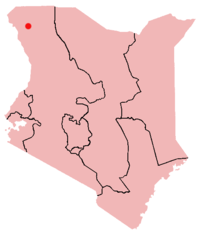
Kakuma
Encyclopedia

Turkana District
Turkana District is an administrative district in the Rift Valley Province of Kenya. Turkana is the northwesternmost district in Kenya. It is bordered by the countries of Uganda to the west; South Sudan and Ethiopia, including the disputed Ilemi Triangle, to the north and northeast; and Lake...
, in the northwestern region of Kenya
Kenya
Kenya , officially known as the Republic of Kenya, is a country in East Africa that lies on the equator, with the Indian Ocean to its south-east...
. Kakuma is the Swahili word for "nowhere", epitomizing the seclusion of the area.
The town has hosted the Kakuma Refugee Camp since 1992. This camp serves over 70,000 refugees who fled wars in neighboring countries. A majority are from southern Sudan
Sudan
Sudan , officially the Republic of the Sudan , is a country in North Africa, sometimes considered part of the Middle East politically. It is bordered by Egypt to the north, the Red Sea to the northeast, Eritrea and Ethiopia to the east, South Sudan to the south, the Central African Republic to the...
, some from Somalia
Somalia
Somalia , officially the Somali Republic and formerly known as the Somali Democratic Republic under Socialist rule, is a country located in the Horn of Africa. Since the outbreak of the Somali Civil War in 1991 there has been no central government control over most of the country's territory...
and the last major group from Ethiopia
Ethiopia
Ethiopia , officially known as the Federal Democratic Republic of Ethiopia, is a country located in the Horn of Africa. It is the second-most populous nation in Africa, with over 82 million inhabitants, and the tenth-largest by area, occupying 1,100,000 km2...
. Other groups include Burundi
Burundi
Burundi , officially the Republic of Burundi , is a landlocked country in the Great Lakes region of Eastern Africa bordered by Rwanda to the north, Tanzania to the east and south, and the Democratic Republic of the Congo to the west. Its capital is Bujumbura...
ans, Congolese
Democratic Republic of the Congo
The Democratic Republic of the Congo is a state located in Central Africa. It is the second largest country in Africa by area and the eleventh largest in the world...
, Eritrea
Eritrea
Eritrea , officially the State of Eritrea, is a country in the Horn of Africa. Eritrea derives it's name from the Greek word Erethria, meaning 'red land'. The capital is Asmara. It is bordered by Sudan in the west, Ethiopia in the south, and Djibouti in the southeast...
ns and Uganda
Uganda
Uganda , officially the Republic of Uganda, is a landlocked country in East Africa. Uganda is also known as the "Pearl of Africa". It is bordered on the east by Kenya, on the north by South Sudan, on the west by the Democratic Republic of the Congo, on the southwest by Rwanda, and on the south by...
ns.
Living in Kakuma as a refugee
Refugee
A refugee is a person who outside her country of origin or habitual residence because she has suffered persecution on account of race, religion, nationality, political opinion, or because she is a member of a persecuted 'social group'. Such a person may be referred to as an 'asylum seeker' until...
is a very difficult experience. Dust storms frequently pass through the area. Malnutrition, communicable disease outbreaks, and malaria are all ongoing problems, while donor support has faltered due to conflicts in other parts of the world. Many of the refugees hope to leave Kakuma for resettlement in another country such as the USA. For example, the "Sudanese Lost Boys
Lost Boys of Sudan
The Lost Boys of Sudan is the name given to the groups of over 20,000 boys of the Nuer and Dinka ethnic groups who were displaced and/or orphaned during the Second Sudanese Civil War , about 2.5 million killed and millions were displaced...
" were a special group of persons resettled from the camp to the U.S. in recent years. With the recent end of the civil war in Sudan between the SPLA and other southern forces against the government in Khartoum
Khartoum
Khartoum is the capital and largest city of Sudan and of Khartoum State. It is located at the confluence of the White Nile flowing north from Lake Victoria, and the Blue Nile flowing west from Ethiopia. The location where the two Niles meet is known as "al-Mogran"...
many are hopeful more Sudanese refugees will finally be able to return home.
The Kakuma Refugee Camp was also the location of a large project from 1995 to 2002 sponsored by Solar Cookers International through which thousands of families began using Solar Panel Cookers to cook their daily meals. Many families had been trading some of their meager food rations for firewood to use to cook what little food they had left. The project was organized such that a group of refugee women were trained to be trainers. These women would then be paid to hold regular classes to teach other women to solar cook and to provide them with a cooker. The cookers were made locally in Nairobi for US$2.00 each.

